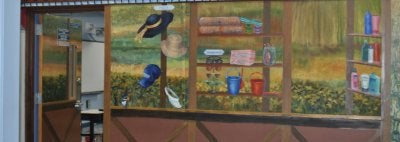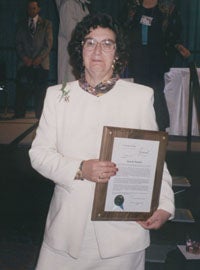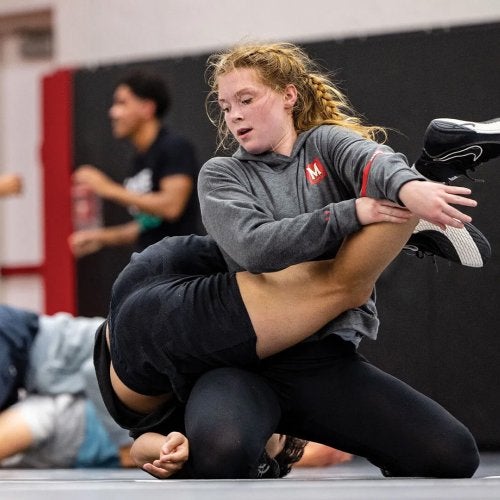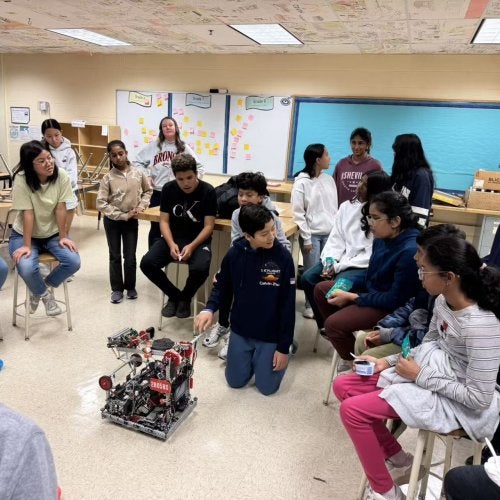

A Proud Tradition in Special Education
Special education in the United States has come a long way in the last 100 years. From excluding students with disabilities to guaranteeing the right to an appropriate education, the landscape has changed dramatically.
The University of Maryland College of Education is proud of its role in furthering special education and training leaders in the field. Since the inception of the special education program, COE students, professors and alumni have been at the forefront of steering the field.
COE alumna Linda Jacobs (Ph.D. ‘71), for instance, founded the Harbour School, which caters specifically to students with disabilities. With campuses in Annapolis and Owings Mills, the Harbour School is a nonpublic special education school, meaning it can accept tuition from local school districts if the districts are unable to provide an appropriate education for a student with a disability. Effectively, the Harbour School acts as a safe space for students with disabilities and gives them room to learn and develop professional skills.
“We look at how the child is designed to learn, and then we match our instruction to the child,” says Dr. Jacobs, executive director of the Harbour School. “So, the child doesn’t have to conform to the teacher. We conform to the child.”
The school stands out in other ways, too. Each Friday, the school transforms into a variety of village shops, where special education students develop professional skills by operating real businesses. This means paying rent and utilities, while attempting to turn a profit and adhering to regulations set by the students’ self-formed and governed Town Hall. The village’s backdrop includes wall murals depicting the village’s shops, and Dr. Jacobs’ cocker spaniels, past and present, running the halls.
“The school does not in the least bit look institutional,” Dr. Jacobs says.
But developments like these are new to special education, which was not even a guaranteed right for students until 1972.
“Prior to the passage of the federal and state laws, including in Maryland, children with disabilities did not have a right to attend a public school if they didn’t meet the requirements of the public school,” says Margaret McLaughlin, COE professor in the Department of Counseling, Higher Education, and Special Education.

Dr. Jacobs, says Dr. Hebeler, who was her advisor in graduate school, had a “huge” influence on the case.
“In fact, back in the early ‘70s when the big push came through with court cases to require school systems to provide appropriate educational programs for kids with disabilities, Dr. Hebeler was scheduled to testify at the PARC case and she was a key witness. The Pennsylvania State Department of Education caved right before she testified. And we used to always say they were so scared of her testimony that they just gave up,” Dr. Jacobs says.
COE is training the next generation of leaders, too. A key issue today in special education, and education in general, is literacy. At COE, Alexandra Shelton, a fourth-year doctoral candidate in the special education program, studies literacy and reading comprehension, and voiced concern over recent National Assessment of Education Progress testing showing low average literacy rates nationwide.
“On the fourth-grade literacy or reading assessment, they found that 35 percent of fourth graders scored at or above a proficient level. So, we have 35 percent of fourth graders who are reading as we expect them to read or above our expectations,” Shelton says. “That means that 65 percent are not reading as they should, and this is fourth graders in general. When you look at the statistics for fourth graders with disabilities, only 12 percent are reading at or above a proficient level.”
COE Associate Professor Jade Wexler, Department of Counseling, Higher Education, and Special Education, echoes Shelton and the NAEP findings. She points out that students in middle and high school studying complex content-area text often struggle with vocabulary and comprehension, and that some also struggle with foundational word reading skills such as reading multisyllabic words.
“There are many challenges related to addressing the varying literacy needs of students,” she says.
One way COE is meeting local literacy needs is through projects and partnerships supported by COE’s Language and Literacy Research Center. Project ProPELL, for instance, provides training for doctoral students to become experts in learning disabilities, language and literacy. Moreover, the Innovative Approaches to Early Literacy Instruction partnership between COE and Anne Arundel County Public Schools focuses on developing the literacy curriculum in grades K-12.
“I think the legacy of COE special education will be preparing teachers across a range of grade levels to be able to use data to drive instruction and to know how to become 'effective consumers of research,’” Dr. Wexler says. “A lot of our faculty do work directly in schools so I hope we can have an impact on the community with our research-practice partnerships to begin to close the research to practice gap.”
Literacy is a critical resource for students of all learning abilities and is a crucial skill for finding employment and continuing on to higher education. For Shelton, the future is literacy, with special education leading the way.
“I really see the field of special education as taking a leadership position in improving literacy for students across the country,” Shelton says. “And it’s important that we don’t forget that everyone needs literacy. It shouldn’t only be accessible for students without disabilities.”
Federal law now guarantees the right of education for students with disabilities. But there is still work to be done and hurdles to overcome, such as ensuring that students get the level of attention, they need to be successful. The University of Maryland College of Education strives to prepare educators to meet the challenges of 21st century education and protect the right of education for all students.
This article originally appeared in the Summer 2020 issue of Endeavors, the UMD College of Education's alumni magazine: https://education.umd.edu/sites/default/files/uploads/Endeavors%20Summer%202020_508_0.pdf
Image 1: COE Alumna Dr. Linda Jacobs in the Harbour School library.
Image 2: COE Professor Emerita Dr. Jean Hebeler with the J.E. Wallace Wallin Education of Handicapped Children Award.
Image 3: COE's Alexandra Shelton, a doctoral candidate in the special education program.


